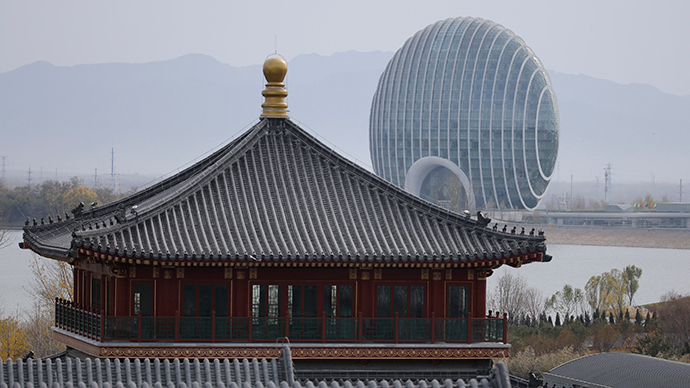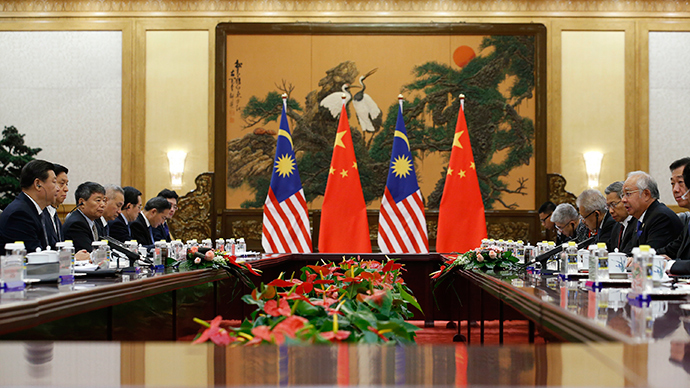‘East Asia shifts its focus from US to China’

China has replaced the US as the largest trading partner and largest market for East Asian countries, while it is also the most important investor in the region, Martin Jacques, Author of When China Rules the World, told RT.
RT:China has been highly active recently - the latest major deals are the one with Moscow and Malaysia. Do you think is Beijing's ambition region-wise?
Martin Jacques: China regards itself to be the most influential power in the region - depends on how you define the region – but certainly in terms of East Asia which obviously embraces North-East Asia, Japan, Taiwan, Korea and also South-East Asia, the ASEAN countries. In a sense it sees itself as returning in some way to its former role.
RT:Do you think China considers itself to be hegemony? How are Beijing's ambitions perceived by its neighbors?
MJ: I don’t think that China thinks of itself in those terms. It sees itself essentially as having major economic presence and influence in the region and growing political influence. But China is very aware that it arrived at this point very quickly and it has a long way to go. I do think that it views itself as likely in the future to increasingly replace the US as the dominant power in the region, and I think it will, it is already beginning to do this.

The underlying reason for China’s importance in the region is its economy. Virtually every East Asian country now counts China as its largest trading partner and its largest market. China is also the most important investor in the region, as well as being the recipient of major investment flows within the region. In the period of the last 20 years, China has fundamentally replaced the US as the major trading country for East Asian nations. If you go back 20 years, then America was their most important export market, now America is not so important economically for East Asian countries. It doesn’t mean it is not important but it is much less important now than China.
The fact is that if you acquire this kind of economic presence and influence, then in time all sorts of things flow from it in a wider sense – political, intellectual, moral, and military. I think we are seeing this process. We are witnesses to East Asia moving from being essentially US-centered to becoming China-centered and it is happening with a great speed.
RT:Washington has been keeping a close watch on the Asia-Pacific region. And media has been speculating on the idea of US-China confrontation on the global political arena. So what’s really going on in the world? Is the US looking to contain Beijing?
MJ: You can see actually what is happening, can’t you? As China rises it requires a new gravitational pull, a new gravitational influence in the world. Everywhere you look, not just in East Asia, not even just in Asia, China is exercising a quiet new pull on countries. Name any European country virtually and it is interested in the kind of deal that Russia is doing on renminbi, and Malaysia has just done on renminbi. There is a sort of competition between Frankfurt, Luxembourg, Paris and London to assume this role within the European context. If you went back ten years ago, you wouldn’t have seen something strong as that or you could just about to begin to perceive it but it wouldn’t be easy, and 20 years ago it would have been incomprehensive, inconceivable.

The relationship with Russia should also be seen in this context. China is becoming extremely important economic power. Of course the relationship economically between them is very disproportional; the Chinese economy is many times bigger than the Russian economy. But they have at least two things in common – the first is that Russia is very rich in natural resources and China is very poor. So there is a natural synergy in their economic relationship - Russia has something to offer to China which China needs. The second thing they have in common is that Russia feels increasingly uncomfortable with the present Western-dominated world order. It feels, and I sympathize with this, that this is a sort of triumphalist reaction in the West ever since the collapse of the Soviet Union. And Russia’s interests, Russia’s needs, Russia’s status is not respected – that is essentially the problem, and Ukraine is an expression of that. This is becoming more and more acute, even Mikhail Gorbachev is saying that there is a danger of a new Cold War, that the West has been unfair towards Russia. So Russia feels very put-upon and discriminated against in the US-led world order.
China is in a different position; it handles itself very differently from Russia in all sorts of ways. And China moves in a different kind of way, more pragmatic actually, much less outspoken is the Chinese way. Basically China, while recognizing the huge importance of the international order as it has been led by the US and under Deng Xiaoping saw over long period to gain admission to it because previously it was outsided, so [China] acknowledges the importance of international order, definitely wants to be part of it, observes the rules, but at the same time it doesn’t feel it has got the same stake in that system as, for example, the US because essentially one is the landlord and the others tenants. So both Russia and China in some degree really share an interest in relationship to this. How far that will go? I think it remains to be seen.
The statements, views and opinions expressed in this column are solely those of the author and do not necessarily represent those of RT.
The statements, views and opinions expressed in this column are solely those of the author and do not necessarily represent those of RT.












